Overseas mines 'facing obstacles'
Updated: 2013-09-26 07:13
By Du Juan in Qingdao, Shandong (China Daily)
|
||||||||
China's overseas mining investment projects are facing obstacles, while domestic output is steadily increasing to meet the country's demand, experts said on Wednesday.
"To further secure mineral resources, China has accelerated overseas mining investments in past years, but many operations face a gloomy future," said Liu Xiaoliang, secretary-general of China's Metallurgical Mines' Association, during the 13th China International Steel and Raw Materials Conference held in Qingdao, Shandong province.
China has 13 overseas mines in operation with a total annual output of 62 million metric tons, which accounted for 8.3 percent of China's annual imports last year, Liu said.
Comparatively, in Japan and many European countries, the overseas mines' output represents more than 50 percent of their imports, he said.
Chinese companies invested in overseas iron ore projects with total reserves of more than 98.72 billion tons, but most of the iron ore needs to be processed, which results in relatively high costs.
"Chinese companies have been developing their overseas resources for more than seven years, but very few of them have projects in operation," said Liu. "Most of them are still at the pre-operation stage and it's difficult to say when these projects will be eventually put into operation."
He said that infrastructure, including water supply, power and ports, is still a big challenge for Chinese companies in overseas mining projects.
"Some projects have much higher investments in infrastructure than those for ore production," he said.
According to public data, the cost of Australian ore is around $30 to $40 a ton.
However, Liu said that some Chinese companies, such as CITIC Pacific Ltd, a Hong Kong-based conglomerate, have costs as high as $100 a ton in their Australian mines.
"There will be no cost advantage when the iron ore is shipped back," he said.
"Chinese companies will learn from previous experiences. And Australian companies are also starting to better understand the Chinese investment process," said Russell Tipper, chief executive officer of Brockman Mining Australia Pty Ltd.
He said a greater understanding between both sides will ensure more robust and sustainable investments in the long term.
In addition, the investment focus of Chinese companies is expected to change from high capital intensity magnetite projects to less capital-intensive hematite projects, said Tipper.
"There's still lots of interest in outbound investment by Chinese companies," he said. "I believe past investments have been in the magnetite sector, which is less mature in Australia compared with the hematite sector. These projects also have high capital intensity which can sometimes result in cost overruns."
At the same time, China's domestic iron ore output is increasing and has higher quality.
According to Liu, domestic iron ore output will reach 1.41 billion tons this year, up 7.5 percent year-on-year.
China's iron ore capacity was 1.58 billion tons in 2012 and the country's real output reached 1.31 billion tons.
dujuan@chinadaily.com.cn
(China Daily USA 09/26/2013 page14)

 Djokovic announces engagement to girlfriend
Djokovic announces engagement to girlfriend
 Taipei, LA and Singapore top travel search growth list
Taipei, LA and Singapore top travel search growth list
 Big cats are part of the family
Big cats are part of the family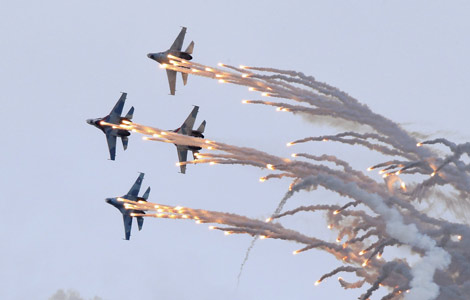
 Arm exhibition at Russia Arms Expo 2013
Arm exhibition at Russia Arms Expo 2013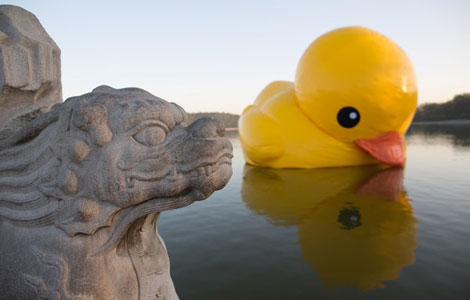
 Rubber duck adjusting to spot at Summer Palace
Rubber duck adjusting to spot at Summer Palace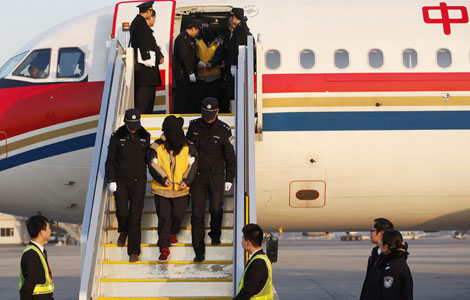
 Suspects in financial offenses arrested in SE Asia
Suspects in financial offenses arrested in SE Asia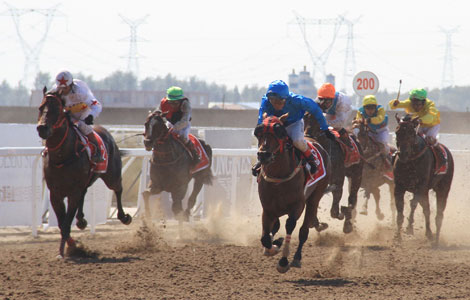
 China champs at the bit
China champs at the bit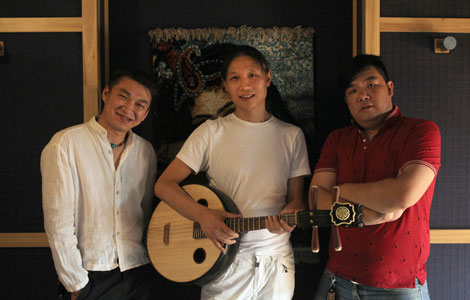
 Echoes of China
Echoes of China
Most Viewed
Editor's Picks

|

|

|

|

|

|
Today's Top News
Ministry welcomes WTO poultry ruling against US
Xi reaffirms education top priority
China, Russia issue joint statement on Syria
China to improve policies for overseas investment
Airbus scores in China with $6b in deals
Concern about environment grows
Rich should fight poverty too: Ho
Li Tianyi jailed for 10 years for gang rape
US Weekly

|

|




